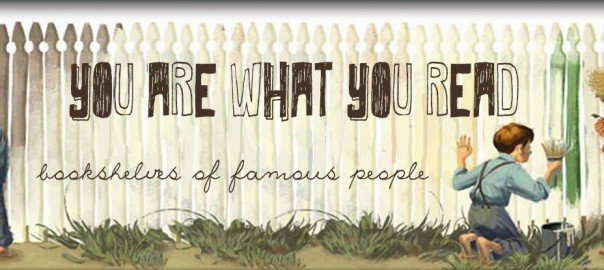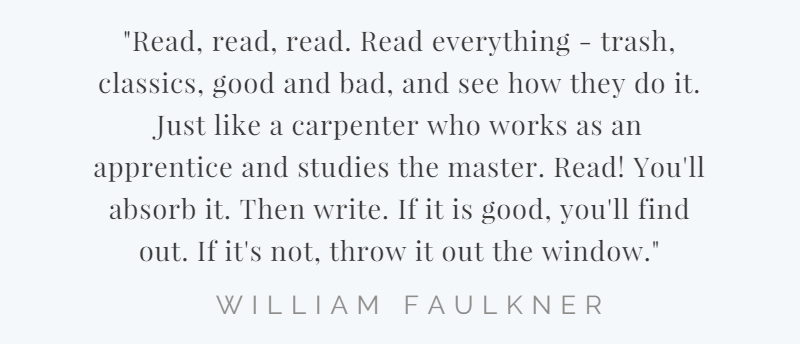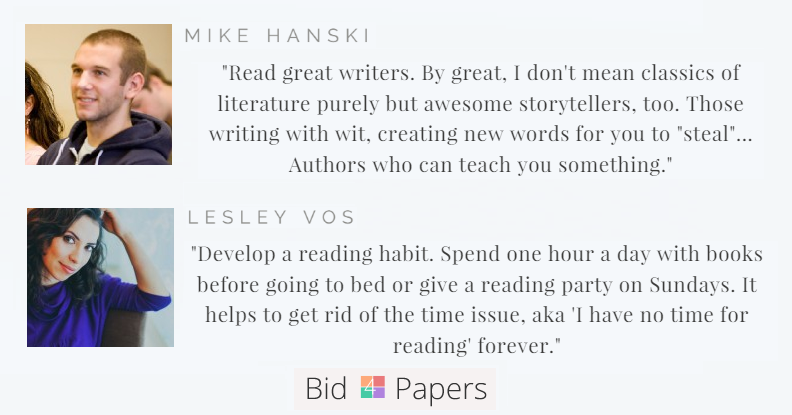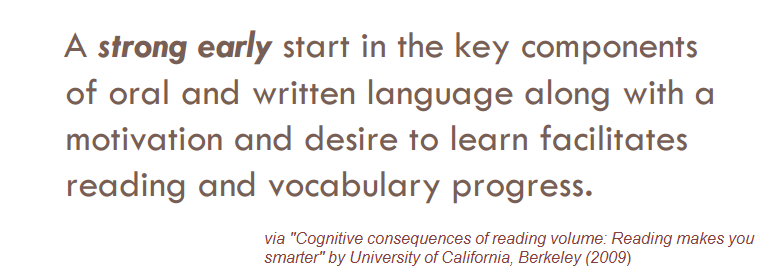
Want to Write Better? Read More, and That’s Why [Infographic]
“A reader lives a thousand lives before he dies. The man who never reads lives only one.”
― George R.R. Martin
The “read more” concept is back in style.
Yes, again.
The great minds have been pointing at books’ positive influence for a long time. And now, we cite their words and agree with that powerful impact books have on us.
A brave new world opens for those who read:
Reading makes us smarter and healthier. It influences the way we think and learn. And it makes us better writers, no matter what we write: essays or fiction.
Any proofs needed?
First, let’s check the bookshelves of famous people. Writers, singers, politicians and even movie characters demonstrate the impact of reading on their mindsets. (Click to enlarge)
Embed:
If you don’t have time to read, you don’t have the time (or the tools) to write. Simple as that.
– Stephen King
Considering King’s writing skills and the number of bestselling books he wrote, you’ll hardly object to the above quote, won’t you? This famous essay writer, novelist, columnist, and screenwriter advocates reading wherever he can, considering it a must-have habit for every smart person.
Does it mean you should read more to become a better writer?
Yes, you should. And that’s why.
How Reading Makes You a Better Writer
Experienced authors agree that writing is a skill, hard to teach.
One can’t complete a course or graduate from a university with a “bestselling writer” diploma. And one can’t become a good writer by learning all grammar rules and several writing techniques by heart. Literacy matters, but it doesn’t make you a writer per se.
What you need is writing a lot (practice makes perfect) and reading a lot. Why is the latter so essential?
- It inspires.
- Reading allows gaining knowledge.
- It will enable changing perspectives on some issues or ideas.
- It gives new viewpoints and shares different techniques for telling your stories.
- Books help you learn from gurus in your genre.
- Reading educates about what has been done in writing already.
- It enhances vocabulary and helps to understand language structures better.
Can you imagine a musician not listening to music? The same is true for writing. Writers work for readers, and no grammar rules or schemes can help you understand people if you don’t read.

Faulkner wasn’t alone in such an approach. Ray Bradbury said that he “spent three days a week” in a public library for ten years, and it was “better than college.” He called a library his alma mater and believed it could give “a complete education for no money.”
We know that Bradbury came from a modest family and didn’t have a chance to graduate from university. And yet, thousands of books he read helped him become “the writer most responsible for bringing modern science fiction into the literary mainstream.” (The New York Times)
But even though you have no plans to become new Ray Bradbury, don’t hurry up to give up reading: what you’ve learned from books works for your more proficient writing.
Thus, our writers at Bid4Papers are all bookworms; otherwise, they won’t be able to deliver academic papers of high quality when you ask to “write my essay.” They read and research tons of material to outline and write the best essays for you.
How to Read More to Write Better
Reading is something we learn to do in school. Once we can combine letters into words, this ask seems the acquired skill, unnecessary to improve.
But here’s the kicker:
It’s not enough to merely read, even if you absorb hundreds of books. All those challenges a la “I’ll read 100 books this year” are bulls**t if you don’t understand and can’t analyze what you read.
Sure, you are welcome to read for pleasure. But if you want books to help you write better, you might need to consider the words by Lori L. Lake:
“It’s one thing to read and enjoy a story; it’s quite another thing to read for MORE than a story.”
And now, you might be wondering:
“How do I know if my reading is efficient? And how can I improve it for better writing?”
Fortunately for us, Mr. Lake shared many actionable tactics that would help us to read more efficiently.
Here they go:
- Identify a genre.
- Examine the language and writing style of the book. Try to analyze why it works or doesn’t work.
- Consider a structure: linear, random, or pyramidic. What format tricks does a writer use to tell this story?
- Identify the topic and tone of the book.
- Examine sentences. How does the author write? Are sentences long? Is the language simple or complex?
- Consider writing techniques an author uses. Do they work well?
- Watch your response to a story. Does it make you sit up and take notice? Or, is it predictable? Try to understand why it’s so.
- Read and compare two different books. What does make them interesting? What did the authors do to achieve that?
- Don’t hesitate to read writings that you wouldn’t ordinarily read.
- Make notes for everything that strikes you in the book and what makes you give up this story. Try to come up with the reason for such a reaction.
And here are tips from your humble narrators:

- Always carry a book with you, especially when on the road.
- Analyze a plot and characters while reading.
- Please pay close attention to words authors use, as it allows you to enhance your vocabulary and use it as instruction for your writings.
- Take the best tricks they use and practice them in your writings. It’s not about blatant copying but learning from masters.
- Experiment on stuff you’ve found: do variations, give their tactics your peculiar flair.
And last but not least:
Enjoy what you read. After all, reading is not about pure analyzing and learning but joy as well. If a story is boring, don’t force yourself to read it. And if you don’t understand what happens in a story because you’re overanalyzing it, don’t give up the pleasure of reading for bare book reviews. If you read for fun, you’ll learn something anyway.
Also, consider the rules of a confident reader:
- Don’t aim at reading everything. Just keep on reading.
- Read what you find exciting and inspiring.
- Put down boring books without remorse.
- Don’t feel ashamed of books you haven’t read. Be proud of the books you’ve read.
- Find your “happy place” for reading.
Bonus!
These are books you might want to check for more professional work, study, and writing:
- For students: 25 Essential Books That Every College Student Should Read
- If you are a teacher: Ten Books Every Teacher Should Read
- What about writers? – The 9 Best Books on Writing That’ll Help You Master Your Craft
- For digital marketers: 10 Books Every Marketer Needs to Have in Their Library
- For entrepreneurs: The 25 Essential Books for Every Entrepreneur’s Library
How Reading Makes You a Better Student
No matter how hard you try, you can’t escape reading when a student. And if you continue considering War and Peace by Leo Tolstoy the worst reading nightmare ever, we have bad news for you:
You are wrong.

Plenty of research and studies prove: reading has a positive impact on student minds. The more you read in school, the better cognitive skills you get. Also, reading helps kids with self-identification and expanding a worldview.
Anything else reading can do to young minds?
- It makes children prepared for school.
- It broadens vocabulary and helps to understand the world better.
- Reading delivers knowledge of subjects they learn at school and university.
- It allows students to remember grammar rules without direct learning.
- Books give students particular text models to use in academic writing.
Plus, it helps to avoid social exclusion. According to the study from Basic Skills Agency,
“Those with the poorest reading skills and the greatest risk of social exclusion were least likely at 16 to have parents who went to their school to discuss their progress. They were most likely to leave school at 16 and feel that school is a waste of time. At 30, they were most likely to be unemployed and feel that ‘whatever I do has no real effect on what happens in my life.'” (Source)
And yet, we shouldn’t consider reading a bare tool for gaining literacy. Our physical and mental health appears to depend on books, too.
Sounds crazy?
Keep on reading to learn more.
How Reading Makes You a Better Person
Reading has a positive impact on your brain, encouraging mental stimulation and slowing the process of Alzheimer’s and Dementia. In plain English, books make us think and, therefore, exercise brain muscles.
What else does reading do?
- Compared to music, coffee, and walks, reading better helps to overcome stress and reduce anxiety.
- Books can increase your empathy level, making you kind.
- They cultivate a so-called theory of mind, allowing you to “read” people’s thoughts and feelings.
- Books broaden the imagination and boost inspiration.
- They encourage and motivate, as well as improve memory.
All told, reading educates and prepares you for life. It broadens minds, helps to learn and understand social experiences, and opens your heart to unexplored.

How to choose a book that you will like
Finding a new book, a student can spend months looking for interesting options to immerse himself in reading and enjoying the story. It isn’t easy to do this because the market is overflowing with average works and various little-known authors. Nowadays, anyone can release a book online, and because of this, the overall level of quality has declined.
As you already know, a strong conclusion in an essay is significant. Just as important as the outcome in a book. These tips will help you find a new book:
- read your favorite authors. Through this, you can often discover new stories and books you haven’t heard yet. Perhaps the author’s style suits you best;
- create a personal list. Keep track of the books you’ve read and look for new ones based on them. This will make it easier for you to decide on the genre or size of literature you want;
- go to a book club. The best advice is to find like-minded people. Thanks to this, you can learn more, see the book from other sides and find many interesting options.
With these simple tips, you can find and read the perfect book. Constant reading also helps you do different research papers, such as writing an outline for an essay or creating essays with a critique.
How to get the most out of reading
Don’t buy books in bulk because that will ruin your experience. Try to find a book that will interest you. Here are some more useful tips from the authors of the Bid4Papers service:
- don’t try to finish every book. Sometimes you may feel like you’ve already spent time on it and want to finish reading completely. But this will only spoil your experience, and you won’t be able to read the next book any time soon;
- don’t get hung up on how many books you’ve read. It’s the same as finding the most common spelling mistakes in articles or product descriptions. It spoils the fun because you have to be creative. It doesn’t matter how many books you have read. What matters is what they were to you;
- take the time to do it. Reading in transport or during class is to reduce your enjoyment. It is better to prepare, make tea, and start reading in your apartment at the allotted time with no distractions.
You can enjoy the author’s work without distraction and get positive emotions.
What’s the bottom line?

Have you already found your best friend among a fabulous kaleidoscope of writing masterpieces?
